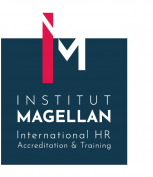Specialized MBA
« International Human Resources and Compensation & Benefits Management »
Training objectives
Taught by practicing professionals and well-reputed experts from the compensation and benefits community, this course allows participants to acquire, develop and update the competencies and practices specific to this occupation, as well as to master methods for managing compensation and benefits in multidisciplinary and operational terms.
Specific abilities:
• have knowledge of all human resources management techniques in order to work as an HR manager;
• support managing directors and managers in setting up a compensation structure by type of employee population;
• be able to manage short- and long-term variable compensation plans, benefits, grading systems and executive compensation;
• set and manage the annual wage bill globally and by region in cooperation with the finance department;
• have the knowledge, skills and behavioral competencies required to work in English with all internal and external stakeholders.
Career paths and opportunities
• Compensation and benefits manager
• Compensation survey coordinator
• Consultant in compensation and benefits
• Regional or country HR director or manager
Duties of compensation & benefits managers
Comp & ben is an area of human resources that has become increasingly important in the last 10 years.
The role of compensation & benefi ts manager originated in a small number of corporations in English-speaking countries without a public welfare system. As such, companies had to develop and manage their employees’ social protection (health, pensions, death & disability cover).
The increasing complexity of compensation, with the advent of variable pay, deferred compensation, stock options, etc., made the role itself more complex. Companies’ internationalization, the talent war, the development, diversifi cation and greater complexity of regulation, plus the quest for short-term and long-term financial optimization have led company directors to consider rewards policy as part of their strategic arsenal, allowing them to attract, engage and retain talents, thereby ensuring their company’s sustainable development.
Duties of compensation & benefi ts managers:
• Proposing compensation policies and systems which meet recruitment, engagement and loyalty targets for the company’s human capital, and which represent the best fit with the company’s human resources policies as a whole (recruitment, career management and development, national and international mobility)
• Design, implement and develop compensation and benefits programs: compensation structures, short- and long-term variable pay, executive compensation, health, death &
disability cover, pensions, employee savings, etc.
• Studies and monitoring of the competition
• Organize pay review processes
• Check and control the fi nancial and accounting impact of compensation schemes
• Run and administer compensation systems in liaison with in-house and external stakeholders (advisors, brokers, banks, insurance companies, social security and other bodies)
• Provide support and advice for decisions related to compensation
• Organize in-house and external communication in order to promote schemes and increase their impact
The MBA trains immediately operational experts and strategists, able to handle these duties.

Course director
Jean-Luc BREYSACH
Director, International Comp & Ben Club
Head of compensation & benefits training
Contact the training coordinator :
contact@magellan-institute.com
+33 (0)1 42 34 75 75
2022-2023 admissions closed
Strong points of the MBA
- RNCP qualification: International human resources manager, level 7 *
- Class of 2020 graduate employment rate: 84% after 6 months
- Pass rate in the last 3 years (2018 to 2020): 86%
- Average gross salary on graduation EUR 47k
- 1,490 hours’ training including 590 hours’ classes delivered by occupational experts and 900 hours in-company
- 2 learning expeditions: Singapore and New York

